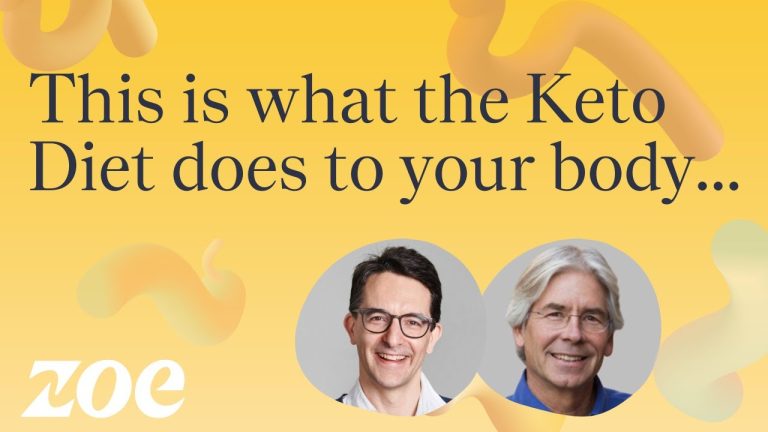As the popularity of the keto diet continues to grow, many people are curious about the effects it has on the human body beyond just weight loss. To shed some light on the topic, we had the pleasure of speaking with Professor Christopher Gardner, a renowned expert in the field of nutrition and the keto diet. In this post, we’ll share with you the insights he shared with us on what really happens to the human body during a keto diet. Stay tuned to learn more!
Introduction
The ketogenic diet (keto) has been controversially promoted as a weight loss solution in recent years. It involves drastically reducing carbohydrates and increasing fat intake, which leads the body to enter a state of ketosis. While some praise the diet for its effectiveness, others criticize its lack of balance. The keto diet has been associated with blood sugar control, improvements in severe diabetes and inflammation, and weight loss. However, there are misconceptions about the diet, and some versions of it are healthier than others.
Professor Christopher Gardner is a leading nutritional researcher and part of ZOE’s scientific advisory board. He conducted a clinical trial on the effects of keto on the human body. In this article, we will discuss the potential benefits and drawbacks of keto diets and the insights provided by Gardner’s study.
Why Is Keto So Controversial?
Before diving into Gardner’s study, it is essential to understand why the keto diet is so polarizing. Many people have praised it for its effectiveness in weight loss. However, others argue that the diet is unrealistic, unbalanced, and difficult to maintain.
There are misconceptions about the keto diet. Contrary to popular belief, it is not high in meat but rather emphasizes the intake of healthy fats such as avocados, nuts, seeds, and fish. Furthermore, it is possible to lose weight on a keto diet, but it can be very restrictive and difficult to sustain in the long term.
One of the most significant criticisms of the keto diet is that it eliminates grains, fruits, and beans. These foods are typically associated with healthy living and provide essential nutrients such as fiber, vitamins, and minerals. While it is possible to source these nutrients from other foods, it can be challenging to obtain the recommended intake on a keto diet.
What Does the Keto Diet Do to the Body?
The premise of the keto diet is to restrict carbohydrates in the diet and increase fat intake. By doing so, the body enters a state of ketosis, whereby it uses fat as the primary fuel source instead of glucose. This can result in rapid weight loss due to the body breaking down fat for energy. Additionally, keto diets have been associated with controlling blood sugar levels, improving severe diabetes, and reducing inflammation and disease risks.
What Is the Role of Good Carbs Versus Bad Carbs on a Keto Diet?
Despite the misconceptions, not all carbohydrates are equal. When following a keto diet, it is essential to differentiate between good and bad carbs. Good carbohydrates, such as those found in vegetables, are essential sources of fiber, vitamins, and minerals that are necessary for the body’s function. On the other hand, bad carbs, like refined sugars and processed foods, can cause inflammation in the body.
Examining Gardner’s Study
Christopher Gardner conducted a clinical trial on the effects of the keto diet on the human body. The study included 609 participants who were randomly assigned to follow a healthy low-fat diet or a healthy low-carb diet for a year. Both diets followed similar nutritional guidelines, but the low-fat diet was limited to 20 grams of fat per day, while the low-carb diet aimed to keep carbohydrate intake below 20 grams per day in the first two months and slowly increased to below 120 grams per day.
The study found that both diets led to similar weight loss results, but there were differences in some of the other health indicators measured in the study. For example, the low-carb diet led to a decrease in inflammatory markers, but it also increased the risk of elevated LDL (bad) cholesterol levels.
While Gardner’s study provides some insight into the potential benefits and drawbacks of the keto diet, it should be noted that the trial focused on healthy low-fat and low-carb diets and may not represent the effects of other keto diets.
Conclusion
As with most things in life, there are pros and cons to the keto diet. Cutting out carbs can be an effective way to lose weight and improve blood sugar control, but it is also essential to ensure that the diet is well-balanced and nutritionally adequate. Gardner’s study sheds some light on the potential benefits and drawbacks of following a keto diet, but it also highlights the need to examine keto diets on a case-by-case basis.
FAQs After The Conclusion
- Is the keto diet safe for everyone to follow?
- What are some healthy sources of fats on a keto diet?
- Can the keto diet improve insulin sensitivity?
- Are there negative side effects of following a keto diet?
- What should people be cautious about when starting a keto diet?


